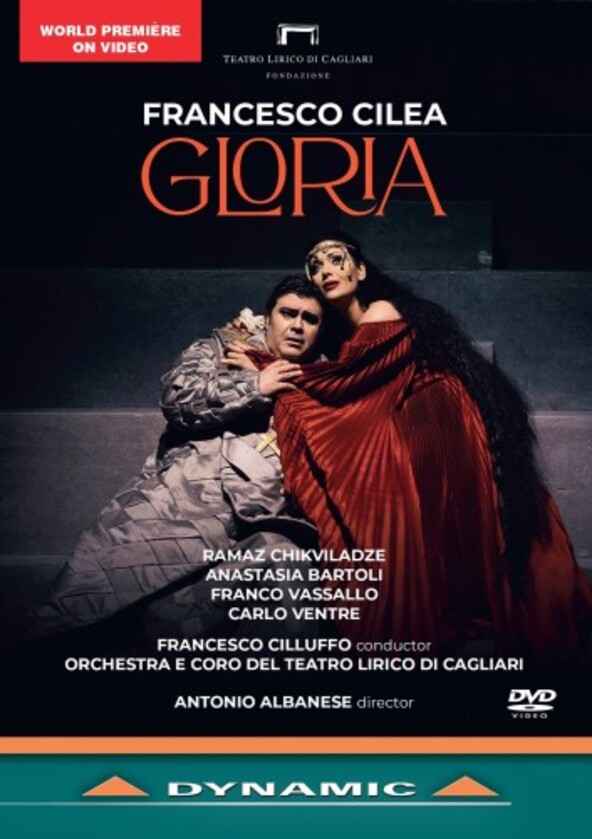CILEA Gloria (Cilluffo)
View record and artist detailsRecord and Artist Details
Genre:
Opera
Label: Dynamic
Magazine Review Date: 09/2024
Media Format: Digital Versatile Disc
Media Runtime: 92
Mastering:
DDD
Catalogue Number: DYN38004

Tracks:
| Composition | Artist Credit |
|---|---|
| Gloria |
Francesco Cilea, Composer
Alessandro Abis, Vescovo, Bass Alessandro Frabotta, Il Banditore, Bass Anastasia Bartoli, Gloria, Soprano Cagliari Teatro Lirico Chorus Cagliari Teatro Lirico Orchestra Carlo Ventre, Lionetto de’ Ricci, Tenor Elena Schirru, La Senese, Soprano Francesco Cilluffo, Conductor Franco Vassallo, Bardo, Baritone Ramaz Chikviladze, Aquilante de’ Bardi, Bass |
Author: Richard Bratby
If you enjoy Francesco Cilea’s Adriana Lecouvreur, you might be pleasantly surprised by its successor, Gloria. That’s no aspersion on Adriana, with which Gloria shares the same warm, surging, verismo-like idiom and sense of theatre. It’s more because Gloria has never really established itself, either in the theatre or on disc. Its first production – at La Scala in 1907 – closed after just two nights; and although Cilea continued to compose into the 1940s, he never completed another opera.
On the strength of this staging from Cagliari, it’s hard to understand the problem. Like Tosca, Gloria is based on a play by Sardou, and the setting is Renaissance Siena, where the civil war between Guelphs and Ghibellines will be familiar to fans of Verdi’s Simon Boccanegra. The plot is a simple drama of two lovers from opposite sides of the conflict: Gloria is a Guelph while her beloved Lionetto is a prominent Ghibelline. You can probably guess the outcome, but that doesn’t make the journey any less compelling.
Admittedly, this is not the Gloria that flopped in 1907 but Cilea’s 1932 revision – his preferred version, by all accounts. The conductor Francesco Cilluffo concurs, and with good reason: with three acts fitted into a taut 92 minutes the tragedy unfolds powerfully and purposefully, without a single wasted note. The score glows with colour and atmosphere – Puccini is the obvious comparison, though some of the orchestral writing is reminiscent of the young Korngold. In any case, Cilluffo is an expert advocate. He’s an old hand in this repertoire, and it shows, with vibrant, responsive sounds from the Sardinian orchestra and chorus.
It’s hard, too, to imagine a more persuasive Gloria than Anastasia Bartoli – a commanding, ardent stage presence with a rich Rioja of a voice. Her singing is wonderfully enjoyable in its own right (Bartoli can really shape and sustain a line), but also pairs well with both the male leads – Franco Vassallo as Bardo, a properly hissable villain with a suitably black-toned baritone, and the tenor Carlo Ventre as Lionetto. That matters because Ventre isn’t an ideal romantic lead, either visually or vocally. He can project considerable power when Cilea demands it but there’s a wiriness about his voice that feels less than ideal in a score as lush as this.
And that’s the other problem: drab, semi-abstract sets and costumes (beige in the first act, grey in the second and bleached white in the third), and lighting that does little to alleviate the visual dreariness. The characters sing of sunlight glittering off a fountain, and Cilea’s orchestra sparkles and dances in harp-saturated ecstasy. But the director Antonio Albanese and his designers give us neutral hues and a stagnant water tank. A bizarre piece of facial jewellery obscures Bartoli’s expressions throughout the final act.
Meanwhile, Albanese’s approach to characterisation and movement is workmanlike at best. Characters stand, characters sing; the chorus lines up on its amphitheatre-like seating with little attempt to suggest the behaviour of a crowd. Cilea presumably imagined the pageantry and teeming, bustling colour of a Renaissance city-state but you’ll get little of that here. Still, there are worse things in modern opera than dreary designs and clunky direction. In most other respects, this film ought to make new friends for an opera that certainly deserves them.
Discover the world's largest classical music catalogue with Presto Music.

Gramophone Digital Club
- Digital Edition
- Digital Archive
- Reviews Database
- Full website access
From £8.75 / month
Subscribe
Gramophone Full Club
- Print Edition
- Digital Edition
- Digital Archive
- Reviews Database
- Full website access
From £11.00 / month
Subscribe
If you are a library, university or other organisation that would be interested in an institutional subscription to Gramophone please click here for further information.





